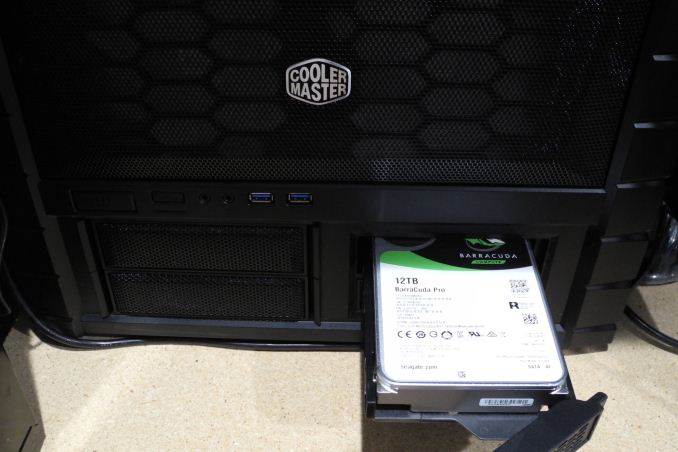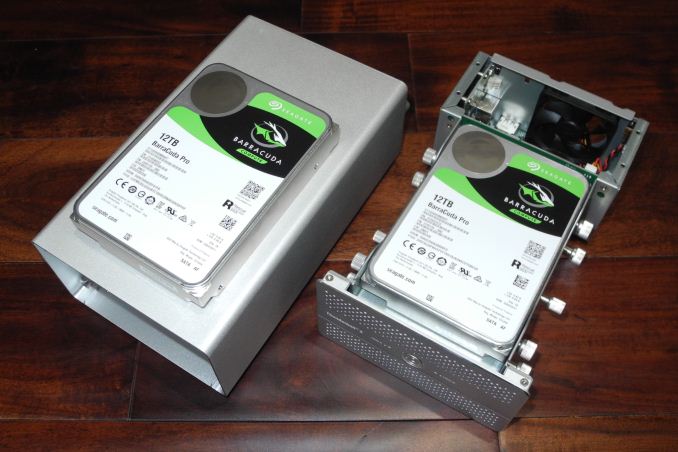Seagate BarraCuda Pro 12TB HDD Review
by Ganesh T S on November 15, 2017 8:00 AM EST- Posted in
- Storage
- Seagate
- HDDs
- Helium HDD
Concluding Remarks
The BarraCuda Pro 12TB is a unique product in the market. It is not often that we see a leading capacity 'desktop-class' hard drive rated for 24x7 operation or workload ratings of 300TB/year. To top it all, Seagate is even throwing in a 5-year warranty. A 2-year data recovery service (DRS) is also included. The lower load/unload cycles rating (300K, compared to the 600K in the equivalent NAS drives) and MTBF (1M hours, compared to 1.2M for the equivalent Pro NAS drive) are slightly disappointing aspects, but, they are more than made up for by the warranty and DRS.
In the gaming desktops market in particular, we are seeing per-game storage requirements running into 100s of GBs, and SSDs continuing to remain above $0.33/GB. Under these circumstances, high-capacity hard drives are bound to become relevant again. In our evaluation, the drive managed to perform quite well for largely sequential workloads (typical of bulk storage requirements in gaming workloads).
Consumers dealing with content creation can also use the BarraCuda Pro as part of a direct-attached storage system. For single-user scenarios, a DAS inherently makes more sense than a NAS. It allows use of enclosures sporting interfaces with higher speeds. The BarraCuda Pro 12TB drive shows great performance in such devices.
In our evaluation, the drive successfully met all of Seagate's claims. Helium drives have achieved economies of scale and are now mass-market devices. The current street price of the BarraCuda Pro 12TB ($500) is already lower than the suggested launch price ($530). The other 12TB Seagate options are the IronWolf NAS drive at $450, IronWolf Pro at $510, and the Enterprise Capacity at $469. We also have the Western Digital WD Gold at $522. The IronWolf has a lower workload rating (180 TB/yr vs 300 TB/yr) and also doesn't have the data recovery service available with the BarraCuda Pro and the IronWolf Pro. None of the enterprise drives carry the DRS option, which justifies the premium associated with the two Seagate Pro drives.
Pricing the BarraCuda Pro mid-point between the IronWolf and the IronWolf Pro would have made it an obvious choice for a high-capacity desktop / DAS usage drive. As it currently stands, it is difficult to choose between the IronWolf Pro and the BarraCuda Pro, as only $10 separates them. The IronWolf Pro also has a higher load/unload cycle rating. Seagate claims that the firmware in the BarraCuda Pro is tuned specifically for typical high-end desktop workloads. However, it is unlikely that consumers will see obvious performance differences between the two drives in typical single-user scenarios. In the end, the DRS ensures that customers are unlikely to go wrong with either the IronWolf Pro or the BarraCuda Pro, irrespective of the end application.












62 Comments
View All Comments
jabber - Thursday, November 16, 2017 - link
I would also say only fools tie themselves down with multi TB amounts of personal data. Data is a millstone round your neck.bigboxes - Friday, November 17, 2017 - link
RAID was not invented to protect your data. It's for uptime. You can live without RAID. Backup is essential for anything you value. RAID is not backup.piroroadkill - Wednesday, November 15, 2017 - link
I find it amusing that people are STILL saying this. When drives hit 500GB, 1TB, you name it, the same comment. Over, and over.You have a backup. Always have a backup.
blackcrayon - Thursday, November 16, 2017 - link
Exactly. Just double the price of every one of these drives in your head. You need two for backup.jordanclock - Wednesday, November 15, 2017 - link
Then don't buy just one. Or have a backup pool of 12+TB.This isn't even a valid talking point. It's just a contrarian interjection.
wumpus - Thursday, November 16, 2017 - link
Which is the whole problem of a 12TB drive with a low TB/$ value. Buy arrays of 3TB drives when you need that type of storage. It isn't a notebook drive, there is no reason to limit the number of drives you are using.Obviously once the number of drives get unwieldy, you will look into 12TB drives. But you will also be looking into tape at those sizes.
Beaver M. - Sunday, November 19, 2017 - link
At least for a NAS you will have to buy a 4+ bay one, which is so expensive that you will pay pretty much the same as for just a 2-bay system and 2 12 TB ones but wont have higher chance of failure.GreenReaper - Sunday, September 2, 2018 - link
If you really just need four bays, grab a HP MicroServer Gen 8. (I wouldn't recommend the Gen 10.)It's an actual miniature server (with iLO!), not just a NAS - but you can turn it into a NAS if you like.
zanon - Wednesday, November 15, 2017 - link
Seriously, since when has mere data size had much if any relation to data value? All of our business (and my personal) financial, tax and investment data is under 10 gigs for example, but losing it would be far worse then a terabyte of data that could (albeit with a lot of time cost) be regenerated. Of course, even that time cost would translate to a lot of lost money and pain, which is why we have backups and also redundancy (since in general it's preferable to not even suffer any downtime).The only major effect of larger drives when it comes to data is that of course they take longer to resilver (this one might be 10-12 hours at 80% capacity), and thus depending on someone's willingness/ability/time cost to deal with downtime in case of multiple failures they may want to switch up their RAID systems to have a higher level of redundancy. That's just an economic decision though and doesn't negate the need for backups as well, preferably offsite.
wumpus - Thursday, November 16, 2017 - link
Backing up 10G should give you plenty of options, and I'd recommend a belt and suspenders approach. Probably just multiple encrypted USB sticks and online storage (make sure they don't object to you pre-encrypting the data before sending it to them, most companies like that assume that they will take unencrypted data for de-duping purposes. This data obviously shouldn't be on servers unencrypted).Just make sure you have some means (presumably SHA256 based) of verifying your USB sticks.